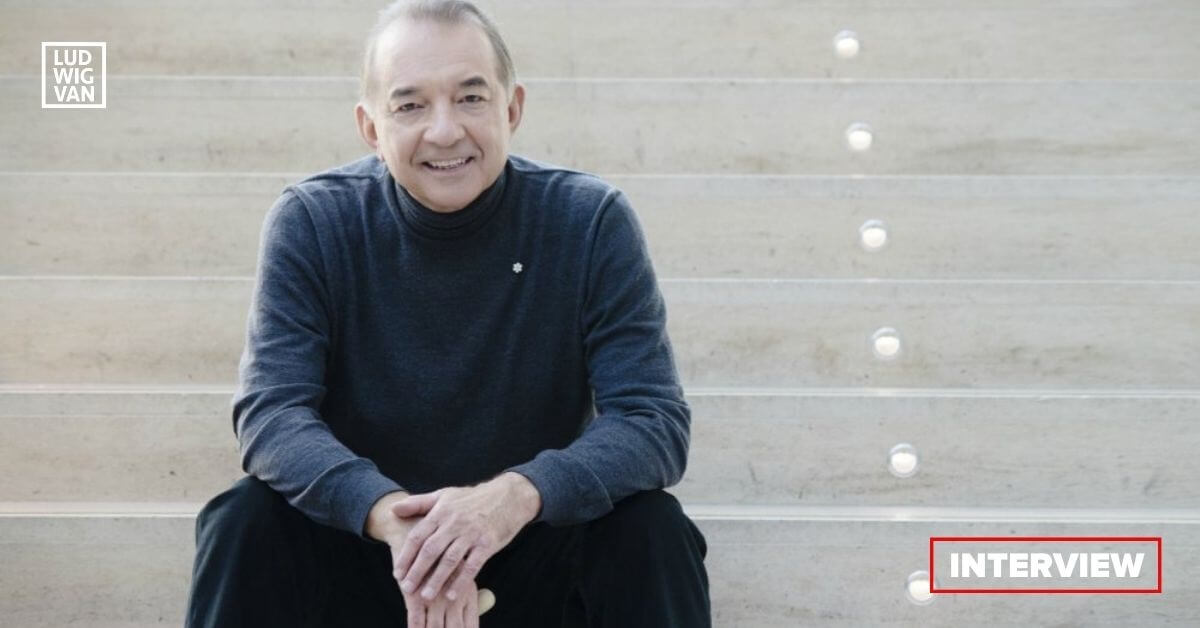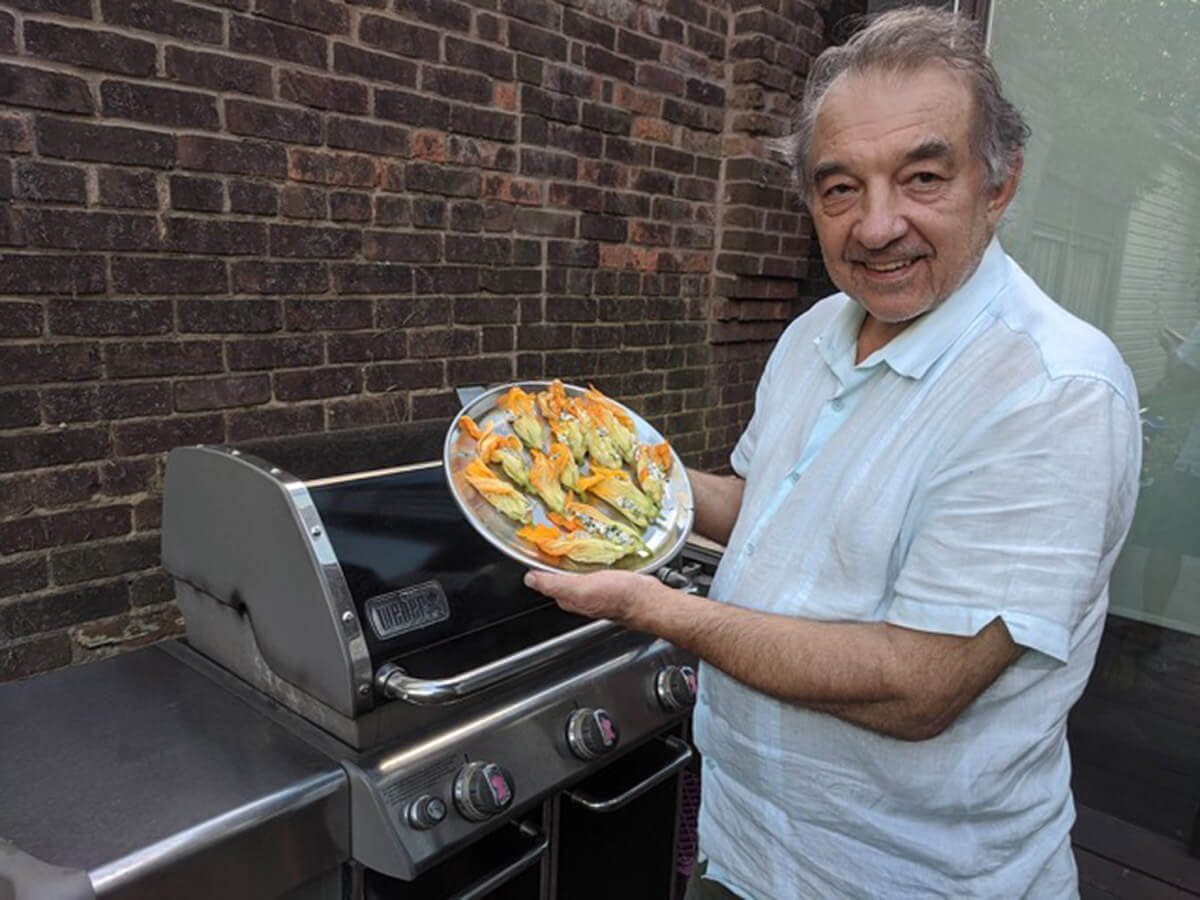
What is the state of new music in Toronto after the pandemic? That’s a question that has no easy answer, but it’s one that Canadian conductor and Esprit Orchestra founder Alex Pauk has given much thought to. In this interview, Pauk discusses the next steps for the Esprit Orchestra, a possible memoir in the works, and career advice for up-and-coming composers. Whether you’re a general fan of contemporary music or a seasoned classical musician, this interview is sure to give you something to think about.
Like many large arts groups, Esprit Orchestra is just now coming to life again after being on semi-hiatus due to the pandemic. As a prolific conductor, how have you stayed active and creative for the past two years?
Well, in both summers that have passed by since the pandemic began, I spent time tending my zucchini plants – not so much for the zucchinis, but for the flowers that I stuff and fry as a mid-to-late summer treat each year. In fact, I got a surprise in the first summer when I accidentally planted what was labelled on the package “Sicilian zucchini”. These Cocuzza Zucchinis overtook my fence and garden with their leaves, and the zucchinis grew about 5 inches a day to a length of 4 or 5 feet. Good recipes for these were hard to find!
The suspension of concert production during the pandemic allowed me time to look for new scores and to think about programming concepts for upcoming seasons. I also had time to study scores that I’ll soon conduct, and I was also able to make tentative starts in composing new pieces and revising old ones. My thoughts also drifted into ways of how I might write a memoir of some kind. The strategic initiatives part of me that keeps Esprit functioning and ready to go never stopped.

I understand you’re reopening with a series of four concerts at Koerner hall starting April 3, 2022. What can you tell us about that?
The series is quite packed with intriguing pieces, some of which we’ve performed before and which have had audiences asking to hear them again. This is a good idea because it’s impossible to fully grasp the meaning, sensibility and structure of a great piece with only one hearing. (Think Beethoven symphonies — how many times are these played repeatedly and why?) It’s possible to continue discovering new things and listening more deeply if the pieces are worthy.
Nine of the fourteen works we’re presenting were commissioned by Esprit and will be receiving their World Premieres. Three of these, by the exceptional women composers Orlando, Volpini and Mermelstein, form a really interesting programming unit, and I’ve commissioned artist Moira Ness to create video interpretations of each piece for projection onstage with the performances.
We also have concerts with composers as performers in their own World Premieres – namely Chris Goddard (a superb pianist) performing his Piano Concerto on April 3rd and Esprit’s RBC Associate Composer/Conductor, Eugene Astapov, conducting mezzo-soprano Shannon Mercer and the orchestra in his A Still Life on April 20th. World-renowned composers Unsuk Chin and Thomas Adès appear in our line-up, and the iconic Sofia Gubaidulina has a spectacular concerto being given its Canadian Premiere by the accordion dynamo Michael Bridge.
You had to press pause on the Esprit’s New Wave Festival. Can we expect to see it returning next season?
Yes, the New Wave Festival will return next season and, in fact, will take on a stronger and more prominent position in our operations, especially in that it will be an important launchpad for music written in our Three-Year Creative Strategy program. This project involves engaging two new emerging composers each season to write a new piece in each of three consecutive seasons. This provides wonderful opportunities for a flow of experience writing for orchestra, and possibilities for audiences to appreciate each composer’s development over time. This relationship-building project now has six composers involved and will operate at full capacity at next year’s New Wave Festival.
We’re coming up on 40 years since you first founded Esprit Orchestra. How has the contemporary music scene changed over the years?
It seems that there have been many compositional trends coming and going and, of course, overlapping, influencing and/or blending with one another. It’s come to the point where you might say the dominant trend is – “anything goes”. Composers are now free of “schools” of composition if they want to be. There are lots of new smaller ensembles that have formed to provide performance opportunities for any taste in new music. After Esprit reinvigorated the field of orchestral writing in Canada in the early 80s, I saw that other traditional orchestras, possibly in glimpsing at Esprit’s programming, began realizing that presenting new music was viable and, taking it seriously, they started having festivals of new music across the country. This has occurred as the number of composers in the country has grown significantly.
You probably have seen more new scores for orchestra works than any person in Canada. How do you find them, and what do you look for in a potential piece for Esprit Orchestra?
I get scores coming at me from all angles – from composers themselves, from publishers (also publishers send bulletins with news of new composers and pieces), from performers (e.g. soloists who have a concerto they’d like to play (knowing that other orchestras won’t touch the pieces because they’re too challenging or might take too much rehearsal time) and from friends and acquaintances. I also spend time online searching for interesting things to listen to. Before the pandemic, I would travel abroad each year to festivals of new music that always provided chances to pick up new pieces and, if not that, stimulation for thinking about new ways of programming.
What I look for in a potential piece for programming is a strong, clear compositional voice being expressed without it being a copy of someone else’s. Often pieces stay in my preferred list (sometimes for several years) until a moment comes when I can see programming it with other works in terms of a program theme. It might also provide the core of a concert, around which other works form a counterpoint. Building a good program is in itself a compositional process and works I choose often act like movements in a larger piece which is the concert program.
What trends are you catching your attention right now?
I’ve never thought about looking for trends to catch my attention – just good music. I can identify trends of course, but that’s not how I approach getting to what I value or like.
If you could give a young composer one piece of career advice, what would that be?
Get out there and mix it up with others – particularly young performers, with whom you should develop musical relationships. Not only is it important for someone to play what you’ve written for you (for your ear and technical learning) either informally or in concerts – large or small, but these players (or people like them) are the ones you’ll be working with in the future. This is part of career-building.
Anything else you’d like to add?
“Live Music Is Best” — motto of the Toronto Musicians’ Association.
***
You can catch Esprit Orchestra’s Esprit Live 2022: Act 1–4 at Koerner Hall from April 3 — June 9, 2022. Full details [HERE].
#LUDWIGVAN
Get the daily arts news straight to your inbox.
Sign up for the Ludwig van Daily — classical music and opera in five minutes or less HERE.
- THE SCOOP | Royal Conservatory’s Dr. Peter Simon Awarded The Order Of Ontario - January 2, 2024
- THE SCOOP | Order of Canada Appointees Announced, Including Big Names From The Arts - December 29, 2023
- Ludwig Van Is Being Acquired By ZoomerMedia - June 12, 2023



